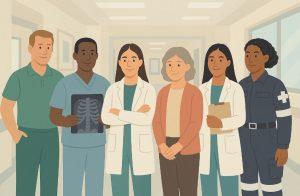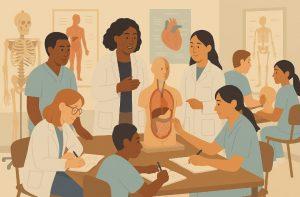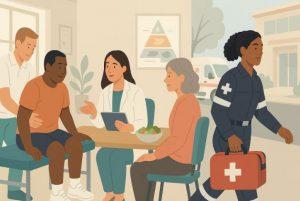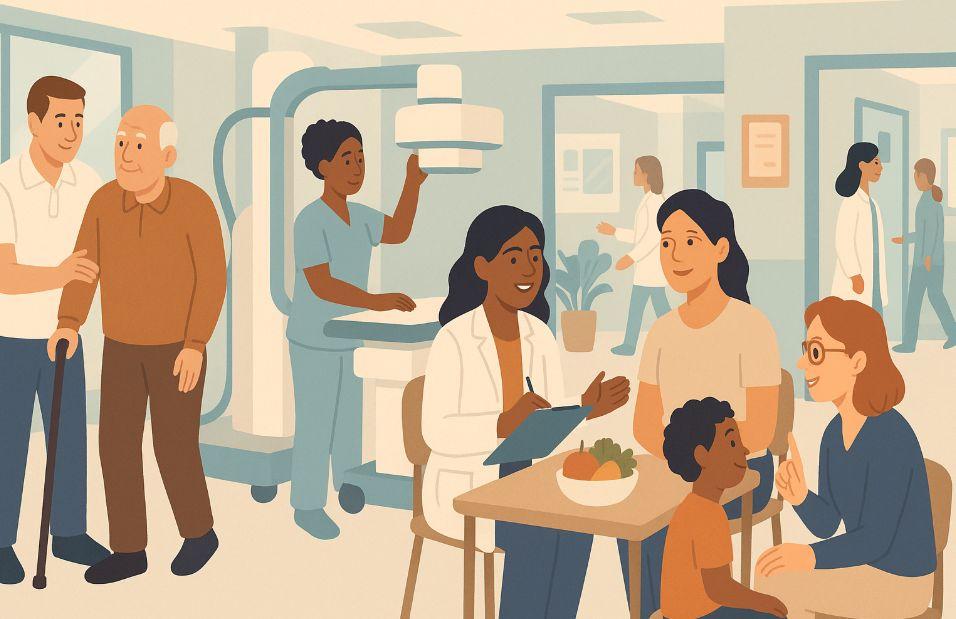In the vast network of healthcare services, allied health professionals serve as vital links that support patients through diagnosis, recovery, and long-term care. While doctors often make the headlines, it’s the allied health workforce that delivers much of the hands-on, practical, and rehabilitative support patients depend on especially within a high-pressure city like London.
This article explores who these professionals are, the range of services they provide, and their growing importance in modern healthcare.
Who Are Considered Allied Health Professionals in the UK?

In the UK, the NHS officially recognises 14 allied health professions, all regulated by the Health and Care Professions Council (HCPC). These roles include physiotherapists, radiographers, occupational therapists, speech and language therapists, dietitians, paramedics, podiatrists, and more.
Each profession is trained to deliver specialised support in physical, mental, or diagnostic care. They may help stroke patients regain speech, create nutritional plans for managing diabetes, or perform life-saving actions in emergencies.
The table below offers a snapshot of these key roles:
| Profession | Area of Focus | Typical Setting |
| Physiotherapist | Rehabilitation and movement recovery | Hospitals, clinics |
| Radiographer (Diagnostic) | Medical imaging for diagnosis | Imaging departments |
| Dietitian | Clinical nutrition and dietary planning | Hospitals, GP practices |
| Speech and Language Therapist | Communication and swallowing support | Schools, rehab centres |
| Occupational Therapist | Daily living and independence strategies | Community and care services |
| Paramedic | Emergency and acute care | Ambulances, A&E |
How Do Allied Health Professionals Support the Healthcare System?
Allied health professionals are instrumental in ensuring that the healthcare system operates efficiently and effectively. Their work extends far beyond the treatment room helping to prevent complications, speed up recovery, and improve long-term patient health.
In London’s complex healthcare ecosystem, AHPs reduce the strain on hospitals by providing community-based services, supporting home care initiatives, and delivering early interventions that prevent hospitalisation.
Their integration into multidisciplinary teams enhances collaboration between GPs, nurses, and specialists, leading to better coordinated care and improved health outcomes.
What Types of Services Do Allied Health Professionals Provide?
The services offered by AHPs cover a broad spectrum, each tailored to specific patient needs. A physiotherapist may focus on restoring mobility after surgery, while a speech therapist helps children overcome developmental challenges.
A dietitian manages nutrition plans for those with chronic diseases, and a paramedic provides life-saving care before a patient even reaches the hospital. These roles work in tandem to support a patient’s full health journey from prevention and diagnosis to rehabilitation and recovery.
Here’s a clearer view of their impact:
| Service Area | Description | Example Impact |
| Therapy & Rehab | Restores function post-illness or injury | Helps patients walk again after surgery |
| Diagnostics | Supports accurate and early diagnosis | Speeds up treatment planning |
| Emergency Care | Delivers immediate, on-scene medical aid | Saves lives before hospitalisation |
| Nutritional Support | Develops dietary strategies for chronic illness | Prevents disease progression |
| Communication Support | Aids speech and language development | Improves independence and learning |
In What Settings Do Allied Health Professionals Work?
The work environments of AHPs are as diverse as their roles. In hospitals, they may assist patients recovering from operations or aid in acute medical scenarios. In schools, they support children with developmental challenges. In homes and community health centres, they provide long-term, personalised care.
In London, where healthcare needs are shaped by population diversity and urban density, AHPs frequently operate in integrated care settings. Many are now also involved in telehealth, making services more accessible across the capital.
What Training and Qualifications Are Required for Allied Health Professionals?

To become an allied health professional in the UK, one typically completes a degree in a specific AHP discipline from an accredited university. This is followed by registration with the HCPC, which ensures ongoing adherence to professional standards.
Courses often include clinical placements that provide hands-on experience. Universities such as UCL, King’s College London, and City University of London offer a variety of programmes designed to prepare students for practical healthcare environments.
Continued professional development is essential, ensuring AHPs stay current with medical advancements and best practices.
How Do Allied Health Professionals Impact Patient Outcomes?
The contribution of AHPs to patient outcomes is significant. Their interventions can reduce recovery time, prevent complications, and improve long-term quality of life.
Consider a physiotherapist who helps a hip surgery patient walk again, or a speech therapist who restores a stroke patient’s ability to speak. These are not just support services they’re life-changing contributions to a patient’s independence and wellbeing.
By enabling earlier discharges, fewer readmissions, and better management of chronic diseases, AHPs also help the NHS save resources and deliver care more efficiently.
What Are the Career Opportunities for Allied Health Professionals in London?
London offers one of the most dynamic job markets for allied health professionals in the UK. From NHS hospitals and mental health trusts to private practices and academic institutions, opportunities abound for both newly qualified and experienced professionals.
Career progression is supported by clearly defined NHS pay bands. For example, entry-level professionals typically start at Band 5 (£28,000+), with experienced roles extending to Band 7 or 8 (£40,000–£55,000) or beyond in management or consultancy.
Additionally, AHPs in London can explore specialisation, research, education, and health policy roles, making it a promising city for long-term career development.
Why Are Allied Health Roles Increasingly Important in Modern Healthcare?

As healthcare shifts towards prevention and long-term support, the need for allied health professionals continues to grow. Their ability to deliver targeted care at different stages of the patient journey helps fill gaps in an overstretched NHS system.
Rising rates of chronic illness, an ageing population, and the growing complexity of patient needs have made these roles more critical than ever. By focusing on restoring and maintaining function, AHPs help reduce hospital admissions and improve population health outcomes.
They represent a more sustainable, community-oriented model of care that aligns with the goals of the NHS Long Term Plan.
How Do Allied Health Professionals Shape the Future of Healthcare in the UK?
Allied health professionals are not just contributors they’re catalysts for change in UK healthcare. As technology evolves and patient needs become more complex, AHPs are taking on advanced roles in clinical decision making, public health, and digital healthcare delivery.
In London, this future is already unfolding. Whether it’s through AI-assisted diagnostics, virtual rehabilitation platforms, or mobile care units, AHPs are helping transform the delivery of care making it more personalised, accessible, and proactive.
As the UK aims for a more integrated and preventative system, AHPs will be central to delivering that vision.
Conclusion
Allied health professionals are more than just support staff they are essential drivers of modern, patient-centred care. Through their specialised skills in diagnosis, therapy, and rehabilitation, they enhance outcomes, reduce system strain, and bring healthcare closer to communities. As the NHS evolves, their roles will only grow in importance, shaping a more responsive and sustainable future for healthcare in the UK.
FAQs
What distinguishes allied health professionals from nurses?
While both support patient care, AHPs typically focus on rehabilitation, therapy, diagnostics, and specialised interventions, while nurses focus more on ongoing clinical care and medication management.
Can allied health professionals prescribe medication?
Certain AHPs such as physiotherapists and podiatrists can become qualified prescribers after additional accredited training.
How long does it take to qualify as an allied health professional?
Most AHP degrees last 3-4 years, followed by HCPC registration. Some roles may also require postgraduate study or specialist certifications.
Are allied health professionals regulated in the UK?
Yes, most AHPs are regulated by the Health and Care Professions Council (HCPC), which ensures they meet national professional standards.
What’s the job outlook for AHPs in London?
Demand is consistently high due to growing healthcare needs, population density, and NHS workforce strategies that encourage extended roles.
Do allied health professionals work in mental health?
Yes, roles such as art therapists, occupational therapists, and drama therapists frequently work in mental health settings to support emotional wellbeing.
Can AHPs work independently?
Many do, especially in private clinics or community settings. Some operate as independent practitioners or consultants.









Leave feedback about this